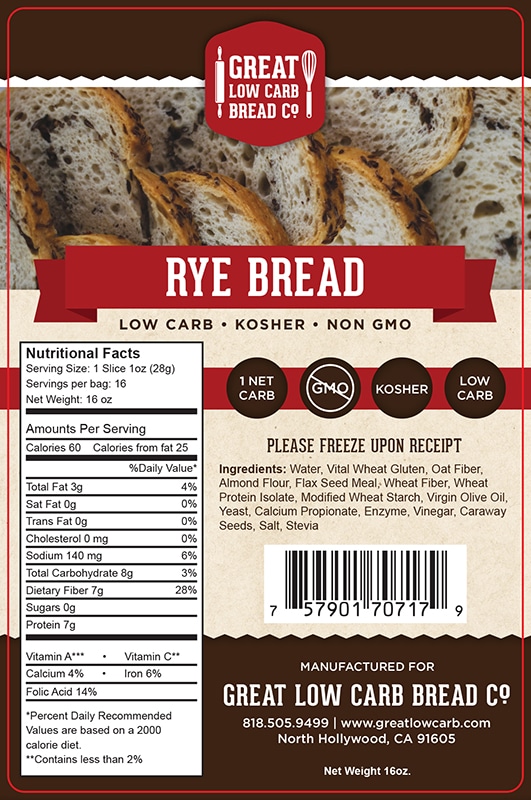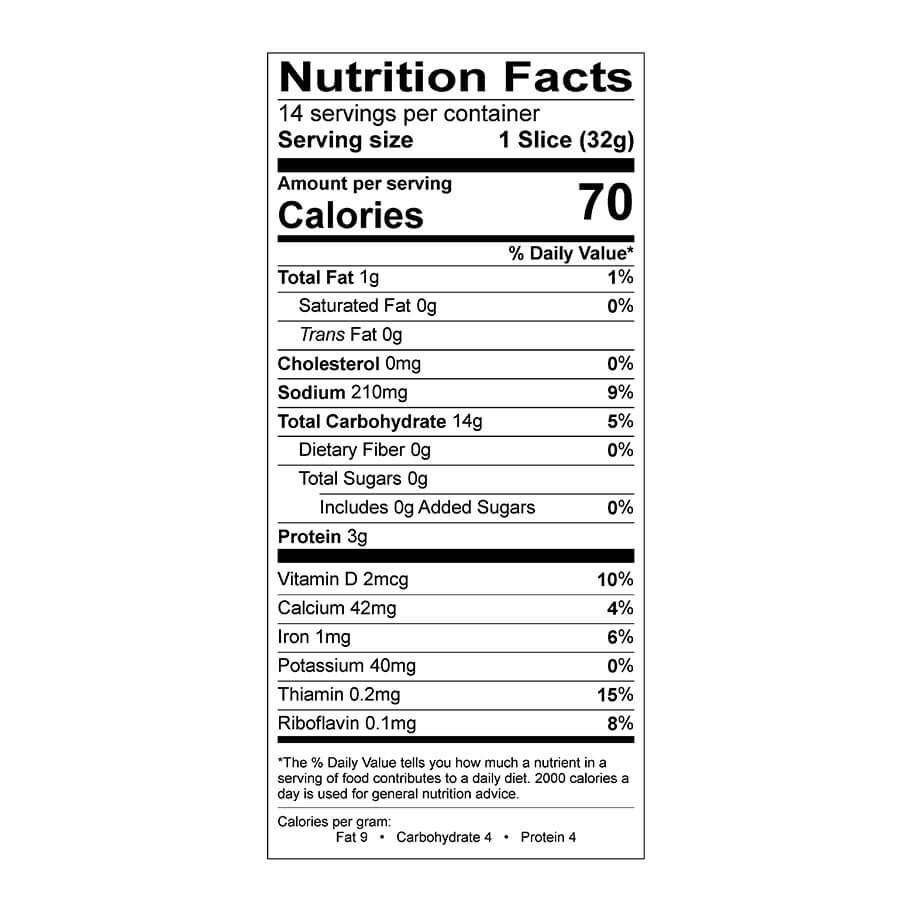Nutritional Value of Rye Bread: potassium, calcium, zinc, and soluble fibre. Compared to wheat bread, rye bread contains more fibre and B vitamins, making it more nutritious.
Rye bread is known for its earthy flavour and dense texture. It provides a filling and satisfying option for those looking for a healthier bread alternative. Its health benefits include aiding in weight loss, improving blood glucose profile, and reducing inflammation.
With its impressive fiber content, rye bread is beneficial for digestive health. It helps with constipation, reduces stomach pain, and potentially prevents serious conditions like ulcers and cancer.
Rye Bread: A Nutritional Powerhouse
Rich In Fiber
Rye bread is fibre-rich, with 4 grams of fibre in just two slices. This makes it an excellent choice for maintaining a healthy digestive system, promoting a feeling of fullness, and aiding in weight management.
Packed With Essential Minerals
Rye bread contains essential minerals such as iron, magnesium, phosphorus, and zinc. These minerals are crucial in various bodily functions, including energy production, bone health, and immune system function.
High In Antioxidants
Rye bread is known for its high antioxidant content, which helps fight harmful free radicals and reduce the risk of chronic diseases. Antioxidants play a vital role in maintaining overall health and well-being.
Source Of B Vitamins
Rye bread is a rich source of B vitamins, including thiamine, riboflavin, niacin, and folate. These vitamins are essential for metabolism, energy production, and maintaining a healthy nervous system.
Health Benefits Of Consuming Rye Bread
Promotes Digestive Health
Rye bread is an excellent dietary fibre source, promoting healthy digestion by preventing constipation and supporting regular bowel movements. The insoluble fibre in rye bread helps add bulk to stool, aiding in its passage through the digestive system.
Helps Control Blood Sugar Levels
The high fibre content in rye bread slows glucose absorption into the bloodstream, helping stabilize blood sugar levels. This can be especially beneficial for individuals with diabetes or those at risk of developing the condition.
Aids In Weight Management
Rye bread has a lower glycemic index than wheat bread, which can help control appetite and reduce cravings. Its fibre and protein content can also contribute to a feeling of fullness, potentially aiding in weight management efforts.
Supports Heart Health
Consuming rye bread as part of a balanced diet may help lower the risk of heart disease. Its fibre content can help reduce cholesterol levels, while its beneficial nutrients, such as magnesium and potassium, can support overall heart health.
Comparison With Other Types Of Bread
Rye bread is a dark, dense bread with a distinctive earthy taste. It is considered more nutritious than wheat bread. It contains more fibre and B vitamins, making it a healthier option. It is also high in iron, potassium, calcium, zinc, and soluble fibre, making it an excellent choice for a nutritious diet.
Rye Bread Vs. Whole Wheat Bread
Rye bread is a nutritious choice because it contains high levels of iron, potassium, calcium, zinc, and soluble fibre. It is darker and denser than whole wheat bread and offers a distinctive earthy flavour.
Rye Bread Vs. White Bread
Compared to white bread, rye bread is considered more nutritious due to its higher fibre and B vitamin content. Rye bread is also more filling and provides a more decadent taste experience.
Rye Bread Vs. Multigrain Bread
Rye bread stands out for its unique nutritional profile compared to multigrain bread. A higher concentration of essential nutrients offers a dense texture and distinct flavour.

Credit: www.bakersplus.com
Incorporating Rye Bread Into A Healthy Diet
Rye bread is a type of bread that offers numerous health benefits and can be a valuable addition to a healthy diet. Whether you want to start your day with a nutritious breakfast, enjoy lunch or dinner, indulge in a tasty snack, or get creative in the kitchen, rye bread can be a versatile and delicious choice. Explore some ways to incorporate rye bread into your damealsLet’ssnacksacks:
Breakfast Ideas
Start your day right with a nutritious and energizing breakfast using rye bread. Here are a few ideas to get you started:
- Spread mashed avocado on toasted rye bread and sprinkle with sea salt and black pepper to create a classic avocado toast.
- You can make a hearty breakfast sandwich by layering scrambled eggs, sliced tomatoes, and lettuce between two slices of toasted rye bread.
- Add a twist to your morning routine by preparing a delicious rye bread French toast. Dip slices of rye bread in beaten eggs mixed with a splash of milk, then cook on a grill until golden brown.
Lunch And Dinner Options
Rye bread can also be a fantastic choice for your main meals of the day. Here are some lunch and dinner ideas:
- To prepare an open-faced sandwich, top toasted rye bread with hummus, roasted vegetables, and feta cheese.
- To create a healthy and satisfying salad, tear rye bread into bite-sized croutons and toss them with mixed greens, cherry tomatoes, cucumber, and your favorite dressing.
- Make a flavorful tuna melt by spreading tuna salad on rye bread, topping it with slices of cheddar cheese, and grilling until the cheese is melted and bubbly.
Snack And Appetizer Suggestions
Rye bread can be the star of tasty and nutritious snacks and appetizers. Here are a few ideas:
- Create crunchy rye bread chips by thinly slicing them, brushing the slices with olive oil, and toasting them in the oven until crispy.
- Toast slices of rye bread and top with diced tomatoes, fresh basil, garlic, and a drizzle of balsamic glaze to make a delicious bruschetta.
- Spread cream cheese on rye bread, top with smoked salmon, and squeeze lemon juice to prepare a simple but satisfying snack.
Baking With Rye Bread
Rye bread can even be used as an ingredient in your baking adventures. Here are a couple of ideas:
- Blend rye bread into breadcrumbs to use as a coating for chicken or fish before baking.
- Tearing rye bread into small pieces and mixing it with herbs, vegetables, and broth creates flavorful and nutritious stuffing.
As you can see, there are countless ways to incorporate rye bread into a healthy and satisfying diet. Its nutritional value, rich flavour, and versatility make it a great addition to any meal. Get creative in the kitchen and enjoy all the benefits rye bread offers!
Tips For Choosing And Storing Rye Bread
Rye bread is a wholesome and nutritious option for those looking to add variety to their bread choices. Whether you prefer rich, earthy, flavoured traditional rye bread or are interested in its potential health benefits, it’s essential to know how to select the proper rye bread and store it to maintain its freshness and quality.
Selecting The Right Rye Bread
When choosing rye bread, look for options made with whole-grain rye flour for maximum nutritional value. Always check the ingredients label to ensure the bread contains whole-grain rye flour as the primary ingredient, and avoid those with added sugars or artificial additives. Opt for bread with a dense texture and a deep, dark colour for a richer rye flavour.
Properly Storing Rye Bread
Proper storage is crucial for maintaining the freshness of rye bread. Store rye bread in a cool, dark place, such as a bread box, pantry, or airtight container, to keep it fresh for longer. Avoid storing rye bread in the refrigerator, which can accelerate the staling process. If you have purchased or baked a large loaf, consider slicing and freezing individual portions to preserve their freshness.
Exploring Different Varieties Of Rye Bread
Rye bread comes in various enticing forms, each offering a unique flavour. Let’s delve into the diverse varieties of rye bread that cater to different tastes and preferences.
Traditional Rye Bread
Traditional Rye Bread is a classic favourite. Its hearty taste and dense texture make it perfect for pairing with savoury spreads or deli meats.
Pumpernickel Bread
Pumpernickel Bread is a dark, rich rye bread with a deep flavour profile that pairs wonderfully with cheeses and cured meats.
Marbled Rye Bread
Marbled Rye Bread is a visually striking creation that combines dark and light rye dough to create a unique marbled effect. It is an eye-catching addition to any bread basket.
Sourdough Rye Bread
Sourdough Rye Bread offers a tangy twist to the traditional rye bread, thanks to the fermentation process that imparts a delightful sour flavour, ideal for sandwiches or toast.
Gluten-free Rye Bread
Gluten-Free Rye Bread caters to individuals with gluten sensitivities, providing a wholesome and flavorful alternative that allows everyone to enjoy the goodness of rye bread without any gluten-related concerns.
Potential Drawbacks And Precautions
Rye bread is generally considered a healthy choice due to its nutritional value, but some potential drawbacks and precautions must be taken.
Gluten Sensitivity And Celiac Disease
Rye bread contains gluten, making it unsuitable for individuals with gluten sensitivity or celiac disease. Gluten can cause adverse reactions in those with these conditions, leading to digestive and other health problems.
Rye Allergy
Some individuals may have an allergy to rye and experience allergic reactions such as skin rashes, digestive discomfort, or respiratory issues upon consumption of rye bread. It is essential for those with known rye allergies to avoid rye-based products.
Fermentation And Gas Production
Rye bread undergoes fermentation during baking, which can produce gas in some individuals, causing bloating and discomfort. This may be a concern for those with sensitive digestive systems.

Credit: greatlowcarb.com

Credit: www.klostermanbakery.com
Frequently Asked Questions Nutritional Value of Rye Bread
Is The Rye Bread Healthy?
Rye bread is healthy and nutritious, high in fibre, vitamins, and minerals. It contains iron, potassium, calcium, zinc, and soluble fibre, making it more nutritious than wheat bread. Rye bread is filling with a distinctive earthy taste and beneficial B vitamins.
What Is The Healthiest Bread You Can Eat?
Rye bread is the healthiest choice due to its high fibre, B vitamins, iron, and lower glycemic content. It’s filling and nutritious.
What Are The Health Benefits Of 1RyeIt’sad’sad?
Rye bread is high in iron, potassium, calcium, zinc, and soluble fibre. It is more nutritious and filling than wheat bread, containing more fibre and B vitamins. Rye also reduces body weight, lowers insulin response, and may reduce inflammation—it is for the digestive system.
What Are The Benefits Of EatIt’sIt’s
Eating rye has several benefits. It aids in weight loss, improves digestion, reduces constipation and stomach pain, and prevents ulcers and colon and breast cancer. Rye is rich in fibre and nutrients like iron, potassium, calcium, and zinc, making it more nutritious than wheat bread.
Conclusion
Rye bread is a nutritious choice packed with iron, potassium, calcium, zinc, and soluble fiber. With its earthy flavour and dense texture, rye bread offers more fibre and B vitamins than wheat bread. Add this wholesome option to your diet for a filling and nutrient-rich experience.




